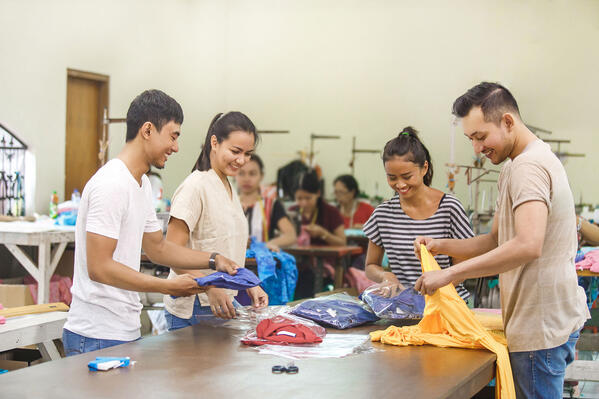Sustainable Economy

Germany is one of the world’s most sustainable industrialised nations. The country does particularly well with regard to growth, employment, social security and environmental protection. That said, in some areas Germany is far from following a sustainable lifestyle, sustainable business, and a sustainable approach to natural resources. Consequently, in 2016 the Federal Government Federal Government The Federal Government and cabinet is made up of the Federal Chancellor and the Federal Ministers. While the Chancellor holds the power to issue directives, the ministers have departmental powers, meaning that they independently run their respective ministries in the framework of those directives… Read more › comprehensively advanced its sustainability strategy and aligned it with the UN’s 17 Sustainable Development Goals (SDGs). The strategy envisages three levels: measures with an impact in Germany, measures taken by Germany with a global impact, and the direct support of other countries by means of bilateral cooperation. Due to the great political significance of the topic of sustainability, responsibility for the strategy lies directly with the Chancellery. Its implementation, however, is the task of the different specialist departments, hence all the ministries are involved.
The Federal Government is set to agree on an updated sustainability strategy in spring 2021. In the run-up to this, German Chancellor Angela Merkel has been urging citizens to get involved in deciding on its orientation, and consultations have been going on since 2019, both in face-to-face meetings and online.
International and national networks
A growing number of companies in Germany are already making a commitment to society as part of conducting sustainable business. Corporate social responsibility (CSR) primarily hinges on each company’s core business, which by dint of globalisation impacts on economic, social and environmental conditions. Most DAX-listed companies as well as many SMEs SMEs The German economy is characterized first and foremost by small and medium-sized enterprises as well as the self-employed and the independent professions. Some 99.4 percent of all companies are small and medium-sized enterprises. These are firms with annual sales of below EUR 50 million and a… Read more › , institutes, and non-governmental organisations in Germany are members of the United Nations United Nations The United Nations (UN) has a key role to play in the international system. Germany has been a UN member since 1973. Since joining, Germany has taken on more and more responsibility and is now one of the largest donors and supporters of the United Nations. For example, Germany is the second largest… Read more › ’ Global Compact Initiative, founded in 1999. The latter, together with the OECD Guidelines for Multinational Enterprises and the International Labour Organisation’s Tripartite Declaration of Principles concerning Multinational Enterprises and Social Policy, form the bedrock of principles on which companies base their CSR efforts. Worldwide, over 12,000 companies from more than 160 countries are members of the voluntary Global Compact Initiative.
Germany is further reinforcing sustainable economic development with its National Action Plan on Business and Human Rights Human rights The respect and strengthening of human rights worldwide are a cornerstone of German Federal Government policy. Together with its EU partners it is committed to protecting and continually advancing human rights standards throughout the world. This occurs in close collaboration with the institutions… Read more › (NAP). The plan was agreed in 2016 and bolsters human rights Human rights The respect and strengthening of human rights worldwide are a cornerstone of German Federal Government policy. Together with its EU partners it is committed to protecting and continually advancing human rights standards throughout the world. This occurs in close collaboration with the institutions… Read more › along supply chains and value-creation processes, whereby it is aligned with the corresponding guiding principles from the UN. Thus far, the NAP has not been legally binding, but the Federal Government Federal Government The Federal Government and cabinet is made up of the Federal Chancellor and the Federal Ministers. While the Chancellor holds the power to issue directives, the ministers have departmental powers, meaning that they independently run their respective ministries in the framework of those directives… Read more › is intending to introduce obligatory regulations if it fails to meet its target by 2020, namely that 50 percent of German companies with more than 500 employees abide by it voluntarily. Monitoring efforts show that this level has not been reached, hence the Federal Government is now weighing up its legislative options.
The fact that doing business goes hand in hand with social and ecological responsibility also becomes evident in the “Alliance for Sustainable Textiles”, which seeks to achieve improvements on both counts for those employed in the textile and clothing industry. More than 130 German textile manufacturers, associations, unions, non-government organizations and others have joined the initiative launched by the Federal Ministry for Economic Cooperation and Development (BMZ) in 2014. Its members cover around 50% of turnover in the German textile market. Considerable improvements have been made on all sides since the fatal accidents in the textile factories in Bangladesh and Pakistan. As of 2018 the Alliance is setting specific standards for all members designed to ensure that the ambitious goals are met. In 2019 members released public progress reports for the first time, according to which 80 percent of the goals it had set have been reached. Through the Alliance, Germany documents its pioneering role with regard to international efforts for fair standards in global delivery chains.


